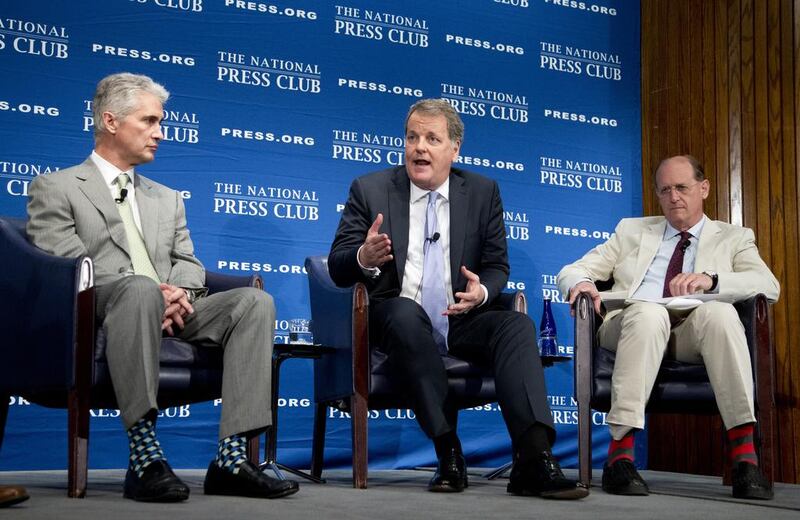The increasingly acrimonious row between the Arabian Gulf and US airlines on subsidies continues to simmer.
The top three US carriers – American Airlines, United Continental and Delta Air Lines claimed in a report released on Friday that Gulf carriers had expanded in the US by 25 per cent this year without generating new traffic.
Etihad Airways also released a report on Friday that said the three US carriers had received more than $70 billion in government and court-sanctioned benefits over the past 15 years.
The US airlines are lobbying the US administration to prevent Gulf carriers from adding extra routes to the US, pending a review of open skies agreements.
“I’m highly confident they’ll take action because the evidence is so compelling and it cannot be ignored,” the American Airlines chief executive Doug Parker said at a National Press Club forum in Washington on Friday. “We are concerned there isn’t enough urgency in the process.”
The Delta chief executive Richard Anderson said the three airlines would take their cause to Congress if the Obama administration did not limit growth by the Gulf carriers.
The study by the economic consultants Compass Lexecon and released by the Partnership for Open and Fair Skies suggested that the increasing traffic and routes being flown to the US by the Gulf carriers is cannibalising the existing passenger traffic, rather than growing the overall numbers.
“The Gulf carriers have failed to meaningfully stimulate new traffic to and from the United States. As a result, the traffic gains enjoyed by the Gulf carriers due to their subsidised expansion to the United States and elsewhere have come at the expense of US and other carriers,” the study said.
According to statistics from Capa Centre for Aviation, Gulf carriers offered 2.7 million seats into the US last year and are forecast to grow that number to 4.3 million in 2016. These projections have worried US carriers, who had asked the US government to freeze capacity at January 2015 levels.
“The Gulf carriers have been under-represented in the US, which is now showing signs of economic strength while other long-haul markets are facing currency or bilateral constraints,” Capa noted.
The US carriers had also previously said that the Gulf carriers – Etihad, Emirates and Qatar Airways – have violated the open skies agreement by accessing $42bn of unfair government aid, a claim the Gulf airlines have refuted.
Will Horton, a senior analyst at Capa, questioned the independence of the Compass Lexecon report, stating that “it takes at face value the allegation Gulf carriers are subsidised, and repeatedly uses the subsidy word.
“The US axis likes to claim it is losing market share. Market share, of course, is relative to the size of the market. Evidence indicates in some areas the US airlines are losing their percentage share but their absolute size has increased because the market has grown. Nobody owns a passenger and is entitled to fly that person. This debate has reverberated around the world for decades: it used to be claims Icelandair was ‘stealing’ passengers, then KLM, then Singapore Airlines and now it’s the Gulf airlines.”
Etihad said: “On Thursday we showed that the big three dominant US carriers have received more than $70bn of government benefits, proving the hypocrisy of their claims. In our formal response to the US government we will prove clearly there is no harm from our market position. On the contrary, we expand markets and therefore opportunities for all”.
Emirates and Qatar Airways did not provide comment.
ascott@thenational.ae
Follow The National's Business section on Twitter






